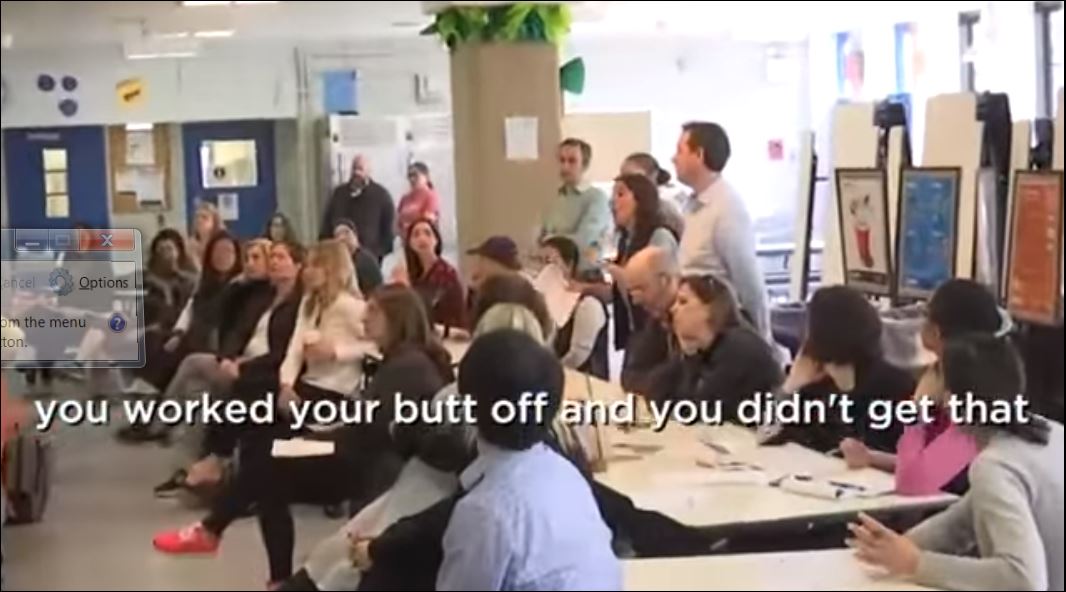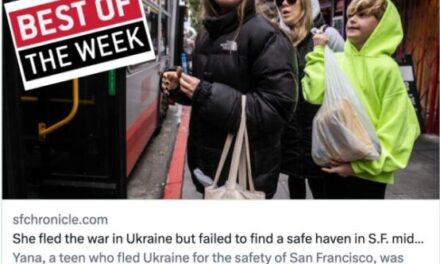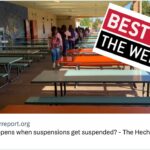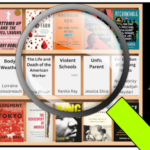BEST EDUCATION JOURNALISM OF THE WEEK
The best education journalism of the week — by far — was Lindsey Christ’s timely and compelling coverage of a heated Upper West Side parent meeting at which some parents got very upset — and a principal responded in kind.
Haven’t watched it yet? You should really take care of that now. The two-minute video — in which one angry mother claims that there are “really only three or four schools that are okay for our children to be going to” — went viral, got retweeted by the new NYC schools chancellor, and drove pretty much the entire week’s conversation.
The Times Metro section and editorial page both used the video. (Though, as Tom Scocca noted, the Times petulantly referred to a “viral video” rather than crediting another outlet for having been there and gotten the goods.) Chalkbeat also followed up based on the NY1 video with pieces on the impact of Chancellor Carranza sharing of the NY1 video and the principal who spoke up for disadvantaged students during the meeting. Christ was a guest on WNY’s Brian Lehrer Show.
The power of Christ’s footage was not lost on fellow education journalists. “To me, one big lesson of this latest UWS segregation controversy is the power of audio/video,” noted Chalkbeat’s Patrick Wall. “Many have written (myself included) about the same issue there, but some folks need to see white privileged people perpetuating segregation in order to believe it.”
Indeed. The snippet from This American Life’s “Problem We All Live With” where white parents denounce the arrival of black kids from Normandy is the only other modern-day segment I can think of that captures some of the intensity behind some white parents’ fears of their children attending the same schools as black children.
Like Wall says, people need to see it. And, thanks to Christ, they are doing just that.
HONORABLE MENTIONS
TEACHERS
🏆 Washington Post: Arizona teachers end walkout despite falling short of aims [see also NPR]
🏆 AP: High pension costs lurk behind US teacher push for more pay
🏆 NPR: Unionized Or Not, Teachers Struggle To Make Ends Meet, NPR/Ipsos Poll Finds
🏆 HuffPost: Nation’s Top Teachers Confront Betsy DeVos In Private Meeting
🏆 Politico: Trump told to ‘take care’ with his language on immigrants
🏆 LA Times: Union gains a foothold in L.A.’s largest charter group [see alsoThe Intercept]
🏆 Fast Company: This DeVos-Style School Turned Teachers Into Gig Economy Workers.
BIG CITIES
🏆 LA Times: Tale as old as time: L.A. Unified superintendent pick follows a historical pattern of outside-the-box choices
🏆 Chalkbeat Detroit: A controversial joint bus route for Detroit district and charter schools hits a speed bump
🏆 WNYC: America’s Largest School Districts Try for Bold Reforms
INEQUALITY
🏆 Philadelphia Inquirer: Danger: Learn at your own risk
🏆 The Atlantic: America’s Declining Investment in Higher Education
🏆 Washington Post: America is more diverse than ever — but still segregated
🏆 Washington Post: Three black teens are finalists in a NASA competition. Hackers spewing racism tried to ruin their odds
🏆 NPR: What ‘A Nation At Risk’ Got Wrong, And Right, About U.S. Schools
NYC SCHOOL SEGREGATION
🏆 The 74: How NYC’s Top Boys & Girls Are Sorting Themselves Into Different Schools
🏆 Chalkbeat: How school choice differs for black and white families in New York City
🏆 NYT: First Test for New York Chancellor: A Middle School Desegregation Plan
🏆 WNYC: New Jersey’s Public Schools Remain Overwhelmingly Segregated
GUN VIOLENCE
🏆 Washington Post: Across the country, measures to arm teachers in schools stall
🏆 The Hill: Illinois House approves plan to replace armed school officers with mental health professionals
🏆 NYT: Tired of Gang Violence, Students Walked Out of Class. Even That Was Dangerous
🏆 Miami Herald: Traumatized Parkland underclassmen plead with Gov. Scott for break from standardized tests
🏆 GQ: The Great High School Impostor
🏆 NJ.com: Mystery pooper at N.J. high school’s track turned out to be superintendent
NOT JUST ANY HIGH SCHOOL STORY

“While a blizzard swirled outside, ProPublica reporter Hannah Dreier sat in the audience of a high school anti-bullying fashion show. Hired last summer to cover immigration, Dreier had driven out to Brentwood High School in suburban Long Island, New York, to try to talk to teachers and administrators about a student named Henry, whose attempt to escape from the gang MS-13 by becoming an informant had instead resulted in his detainment and threatened deportation back to El Salvador. The time ticked by slowly. She wondered how she was going to make it home.”
That’s the opener to Kristen Doerer’s latest contribution to The Grade, an in-depth interview with Dreier about her blockbuster story, “A Betrayal,” exploring what it was like to report on a teenager in such a vulnerable position, what education journalists might learn from her experience, and how the luxury of time and her own persistent reporting reversed her initial assumptions about the school’s culpability for Henry’s fate.
“I just would never have known [the real story] if I hadn’t staked out their school events and sat through their school board meetings to get to talk to these people,” says Dreier.
Check it out. You’re all but guaranteed to learn something useful.
MEDIA TIDBITS

📰 CAREFUL WITH THOSE FUNDING/SALARY NUMBERS: This past week revealed an embarrassing error passed along by a number of news outlets covering the Colorado teacher protests. It turns out the state is not 46th in the nation for pay, as so many outlets reported. It’s roughly 30th. Chalkbeat reported the error and explained its source. But it was sloppy work. Why didn’t anyone check them out earlier? You may recall that there were similar problems with the coverage of Oklahoma education funding cuts, which were reported to be 30 percent.
📰 YOU SAY YOU HATE DEVOS: Last weekend, comic Michelle Wolf told the White House Correspondents Dinner crowd “You pretend to hate [Trump], but I think you love him. .. He’s helped you sell your papers and your books and your TV.” Much the same could be said of national education journalists and Betsy DeVos, whose name in the headline all but guarantees clicks and shares and everything else a journalist might want.
📰 MAKING A MESS OF IT: The NYT Metro segregation story was another hot mess, attempting as it did to make the case that choice substantially exacerbates segregation in New York City schools. The study it’s based on admits that choice is only a marginal contributor to segregation. The story admits as much, deep down: But that admission doesn’t seem to warrant much mention anywhere near the top of the story, and it didn’t stop all sorts of folks from losing their minds trying to point at choice as a major contributor to segregation in NYC. WNYC’s version went even further, claiming that the study “rebuts” the notion that segregation is the result of housing — an obvious overstep that I hope will be corrected.
📰 PRAISE FOR NEWSROOM COVERAGE OF SCHOOL CHOICE: You might be glad and surprised that this new AEI report finds that newsroom coverage of school choice research is generally balanced. It finds that “news stories in these outlets played no favorites when covering school choice research.” The coverage was balanced among and within outlets, according to the report. “For example, The New York Times published two articles referencing a positive study and three articles referencing a negative study; for The Washington Post, the figures were five and three.”
📰 A STRANGE CHOICE OF TOPICS: NYT education reporter Dana Goldstein’s big piece on the handful of foreign workers who are teaching in American classroom hit me all kinds of wrong ways. The number of foreign visa workers is small — fewer than 3,000 across the entire US, according to Goldstein’s own story. And the use of foreign teachers is not even really a new story. USA Today (among others) wrote up the phenomena nearly a decade ago. There are so many other, objectively more important stories that warrant coverage. Of course, lots of folks liked the story a lot, and Goldstein was gracious enough to respond: “How is the public served by *not* knowing about an interesting phenomenon a reporter learns about, which — while limited in size, as the story clearly states — sheds light on larger issues and problems?”
📰 FIGHTING OVER CHICAGO: Responding to positive news coverage about progress in Chicago schools, PPI’s David Osborne tweeted about the continued “misuse of Sean Reardon’s study” by media outlets. As you may recall, the NYT’s Emily Badger was the first to use that data in a story that highlighted the notable progress Chicago has made. She responded that Osborne’s critique was misleading and that his interpretation “reads to me like an attempt to slice the data so that it says what you want it to say about charter schools”
📰 WHAT MAKES EDUCATION REPORTING “SO BORING”: Way back in 2015, The Atlantic’s Alia Wong argued that over-use of jargon was the main reason that education reporting was “so boring.” But there are several other possible explanations (and of course plenty of education reporting is compelling). What do you think? My current view is that it’s a storytelling problem, and a newsroom diversity issue as well.
📰 MORE STORIES ABOUT TEACHERS: The big media news out of this year’s Atlantic education summit (held earlier this week in DC) was the launch of a new project On Teaching, headed by Mother Jones’ Kristina Rizga. The focus is on “conversations with veteran educators around the country”. The project seems somewhat similar to the podcast series What My Students Taught Me, but it could be a welcome addition. Meantime, Chalkbeat is launching another newsletter, this one focused on teachers.
📰 CROWDTANGLE MEETS REDDIT: “Chasing spikes is an unsustainable way to approach traffic. It’s better to build a smaller, loyal audience that visits a site with frequency than it is to chase viral stories,.” note the helpful folks from Crowdtangle, one of my favorite social media tools (even though it’s apparently part of Facebook). They also now have a feature that allows you to track your Reddit mentions, in case you want to make friends there (which you should).
📰 A BLEAK LITTLE GAME: The innovative folks at The Hechinger Report have developed a game that shows what it’s like to be a parent trying to enroll your child in high-quality, affordable preschool. “It is a bleak little game,” tweeted Greg Toppo. Games, cartoons (aka graphic novels), podcasts. What are folks going to try next?
📰 RENT HELP FROM PARENTS: Roughly 45 percent of education and social workers in their early 20s get $250/month in rent help from parents, according to this 2017 NYT piece. What are the numbers are for young journalists? Apparently, there’s not any data on that, but I’m guessing it’s pretty high.Journalism jobs are infamously low-paying, and as we’ve written before, the fellowship model isn’t all that much better than the unpaid internship model it replaced.
Want more? Check out the best and worst education journalism for April, which came out earlier this week. Some problem areas, sure there are a few. But also so many awards & so many great stories.
PEOPLE, JOBS, & AWARDS

🔥 The Livingston Awards for Young Journalists announced the 2018 finalists in local, national and international reporting on Tuesday. Among the finalists: Bethany Barnes of The Oregonian, whose eviction series is one of our favorites, Emmanuel Felton of The Hechinger Report, who has written about segregation, and the Washington Post’s John Woodrow Cox, who has written about gun violence and children. Congrats to all!
🔥 The Voice of San Diego has an interesting look back at Mario Koran‘s five years covering San Diego schools, timed to his recent departure. Still no word on where he’s going to land next. Crossed fingers it’s somewhere good.
🔥 Chicago Sun-Times reporter extraordinaire Dan Mihalopoulos is joining WBEZ. He’s written a bunch of education stories, including co-authoring the #EWAawards finalist piece documenting the fall of former Chicago schools chief Forrest Claypool.
🔥 In a keynote speech at the Magnet Schools of America conference in Chicago last week, Nikole Hannah-Jones is said to have called magnet schools “tools of inequality” designed to “keep White parents in a district and not integrate schools.” Hannah-Jones also spoke with Ms. Magazine about journalism and resistance. Want more? The Grade’s profile of her is titled Nikole Hannah-Jones, the Beyoncé of journalism (which is how she identifies herself on Twitter).
🔥 I am inordinately excited that Vox’s Alvin Chang is going to be on a school segregation panel at EWA’s national conference later this month. While other journalists focus on choice and charters, Chang focuses on the core feature of school segregation in America: residential segregation and neighborhood attendance zones that often reinforce rather than mitigate school segregation.
EVENTS, DEADLINES, & ANNOUNCEMENTS
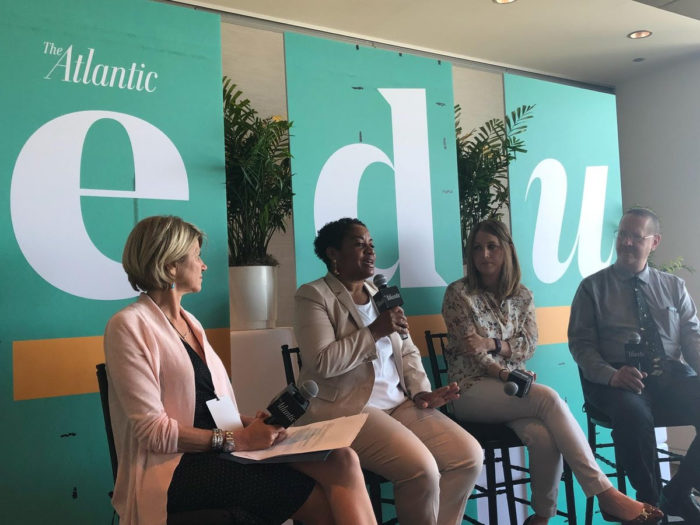
⏰ The Atlantic’s Education Summit was held Tuesday. Among the highlights was the panel on segregation with Hechinger’s Emmanuel Felton, who wrote about school districts seceding in Jefferson County in Birmingham, AL. “We wanted to zoom in on where segregation was getting worse the most rapidly,” said Felton.
⏰ The Russell Sage Foundation is accepting applications for their Visiting Journalist Fellowship until May 1. The foundation will pay visiting journalists an honorarium of $8,000 per month for a full-time visit lasting two to three months.
⏰ Are you ready for EWA’s annual conference later this month? The full agenda is out online — jam-packed with interesting and thought-provoking panels. Among the events we’re looking forward to are the discussions on “How Colleges Use, Abuse, and Hide Student Data” and “Plenary on Student Activism,” with student gun reform activists Emma González and David Hogg of Parkland, Alex King of Chicago, and Jackson Mittleman of Newtown, Connecticut.
⏰ CityBureau’s Summer 2018 Reporting Fellowship applications are open. If you want to get an amazing journalism experience within the most innovative newsroom in Chicago, apply before May 28: citybureau.org/reporting-fell…#jourjobs
⏰ Boston University’s Data-Driven Storytelling Workshops are taking place June 4-8. Register here.
⏰ There’s at least one education-related #IRE2018 panel: Behind the story: Schools without rules (Orlando Sentinel story). Check it out here. June 14-17, Orlando FL.
⏰ It’s a long way off, but registration is open for the 2018 Online News Association Conference taking place Sept. 13-15 in Austin, Texas. Register now to catch the early-bird rate.
Big thanks to everyone on Twitter who’s following @thegrade_, which just reached 2,000 followers. If you haven’t done so already, come on over and join the fun!
KICKER

Education journalists have some pretty fascinating family backgrounds. BuzzFeed’s former education reporter Molly Hensley-Clancy’s mom founded an experimental theater. EWA’s Emily Richmond’s mom was a contributor to the original edition of “Our Bodies, Ourselves” (pictured above). My dad played trombone in a famous jazz band. What’s *your* familial/ancestral claim to fame?
The Best of the Week newsletter is “a terrifically informative & fun weekly roundup of the best ed writing nationwide,” according to New York Daily News education reporter Ben Chapman. We can’t argue with that. Sign up here for the free weekly email. It comes out on Fridays, and then gets posted online the following Monday.
ABOUT THE AUTHOR

Alexander Russo
Alexander Russo is founder and editor of The Grade, an award-winning effort to help improve media coverage of education issues. He’s also a Spencer Education Journalism Fellowship winner and a book author. You can reach him at @alexanderrusso.
Visit their website at: https://the-grade.org/

